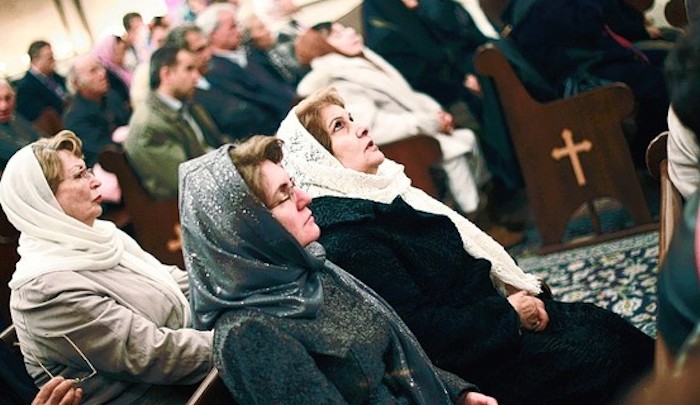Islamic Republic of Iran: Authorities raid Christian homes, ask them to leave country
March 1, 2015 /Jihad Watch/Iranian Christians“Irani, a convert from Islam, had originally been charged with ‘Mofsed-fel-arz’ or ‘spreading corruption on Earth,’ which carries the death penalty.”“Indeed, the penalty for those who wage war against Allah and His Messenger and strive upon earth corruption is none but that they be killed or crucified or that their hands and feet be cut off from opposite sides or that they be exiled from the land. That is for them a disgrace in this world; and for them in the Hereafter is a great punishment.” (Qur’an 5:33)
“Authorities in Iran Raid Christians’ Homes, Ask Them to Leave Country,”
Morning Star News, March 1, 2015
ISTANBUL, Turkey (Morning Star News) – A Christian in Iran who received 80 lashes for drinking communion wine has been asked to leave the country, human right activists said. Agents from the Iranian intelligence service, known as VEVAK, on Feb. 16 raided the home of Mehdi Reza Omidi and two other members of house churches in Rasht, Saheb Fadaie and Yasser Mosayebzadeh, according to Christian Solidarity Worldwide (CSW), a United Kingdom-based advocacy group. Omidi was one of four men sentenced on Oct. 6, 2013 to 80 lashes for drinking communion wine and owning a satellite antenna. Rights advocates believe the flogging was carried out within a month after sentencing.
After the Feb. 16 raids on the homes of Omidi and the two others, authorities ordered the three Christians to report the next day for questioning, where officials asked them to leave Iran. The agents also confiscated their Bibles, laptops, Christian CDs and religious literature, according to CSW. Kiri Kankhwende, press officer for CSW, said authorities asking Christians to leave the country is just one of the many ways the government pressures religious minorities and suppresses Christian growth. Other ways include harassment, confiscation of property, arrests and imprisonment on false charges.
“All of these things are designed to get converts to recant or stop their involvement with churches,” Kankhwende said. “But sometimes it is easier, as prison sentences can result in a lot of unwanted press attention, to make the lives of Christians difficult and untenable, so that they choose to leave of their own accord. Sometimes veiled threats are made, or other times – as is the case here – they can be politely asked to leave.”The impetus for the raids remains unknown. Omidi was detained previously on Dec. 31, 2012, for his involvement in a house church.
On the same day the raid took place, authorities released Rasoul Abdollahi from Rajai Shahr Prison in Karaj, according to Middle East Concern (MEC), another advocacy group. Officials, however, placed strict conditions on Abdollahi, a convert from Islam, including prohibiting him from participating in Christian activities with others. If he violates any of the terms of his release, he could be forced to serve the one year left on his sentence. Authorities arrested Abdollahi on Dec. 26, 2010, along with a group of other Christians. In December 2013, he was sentenced to three years in prison on convictions of “collusion against the government” and evangelism. He was sent to Evin Prison, but in October 2014 officials transferred him to Rajai Shahr Prison in Karaj.
The release resembles the conditional release authorities gave to Vahid Hakkani. On Jan. 26, after holding him for three years, Iranian authorities released Hakkani from Adel-Abad prison in Shiraz. According to MEC, the Revolutionary Court made Hakkani sign a document stating that he would not attend or host any Christian-related activities or house-church services. A condition for issuing his release order was that he would sign the disclaimer.
Previously, Hakkani engaged in a hunger strike starting on March 20, 2014, after authorities denied him a conditional release that inmates are eligible to obtain after completing half their prison terms. Authorities arrested Hakkani on Feb. 8, 2012, along with several others at a house-church meeting, and charged him with numerous criminal offenses related to his faith. Hakkani was tried with three others over the course of two court hearings, one on Oct. 15, 2012 and another on Dec. 28, 2012. In June 2013, the Shiraz Revolutionary Court issued a verdict, finding all four guilty on charges of attending a house church, spreading Christianity, having contact with foreign ministries, propaganda against the regime and disrupting national security, according to advocacy groups.
Another pastor, Behnam Irani, who is serving a six-year sentence, last month was refused the same conditional release granted to Abdollahi and Hakkani. According to CSW, prison authorities agreed to Irani’s conditional release, but a judge did not. Jason Demars, president of Present Truth Ministries, said that it is common for Iranian authorities to force Christians to sign agreements to refrain from Christian activities when they are granted an early release.
“A lot of the times when they let them out, they have them promise that they won’t engage in the activities like they did before,” Demars said.
Demars said it is possible that the Iranian government tried to get Irani to sign such an agreement to be released, which he likely refused. Demars is trying to confirm this with sources in Iran.
On Oct. 19, 2014, Irani was sentenced to six years in prison for “action against national security” and “creating a network to overthrow the system,” catch-all terms the Islamist government uses to suppress Christians and political opponents it perceives as threats. When the verdict was handed down, Irani was already serving the remainder of a prior five-year sentence for his involvement with house churches. Irani, a convert from Islam, had originally been charged with “Mofsed-fel-arz” or “spreading corruption on Earth,” which carries the death penalty. But those charges were reduced on Oct. 2….















